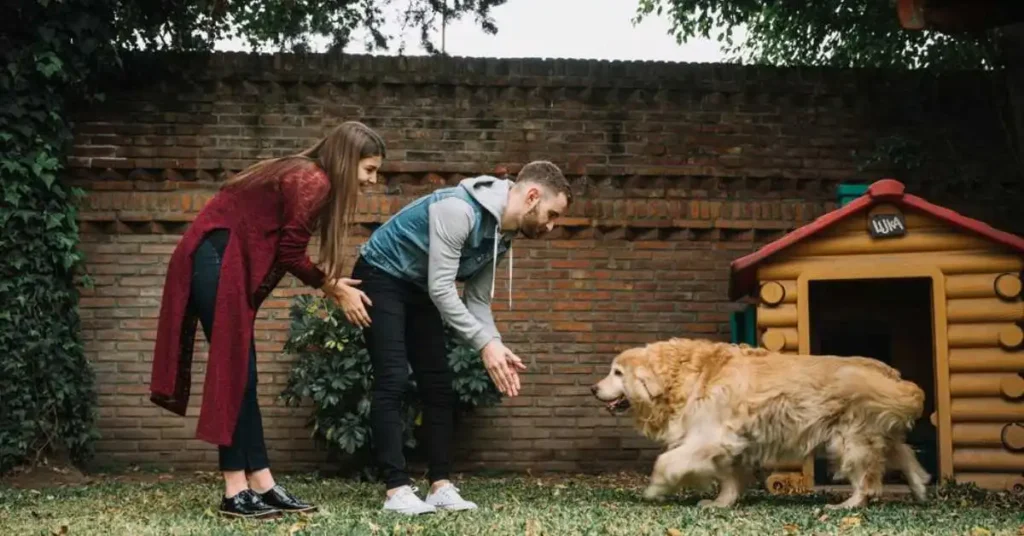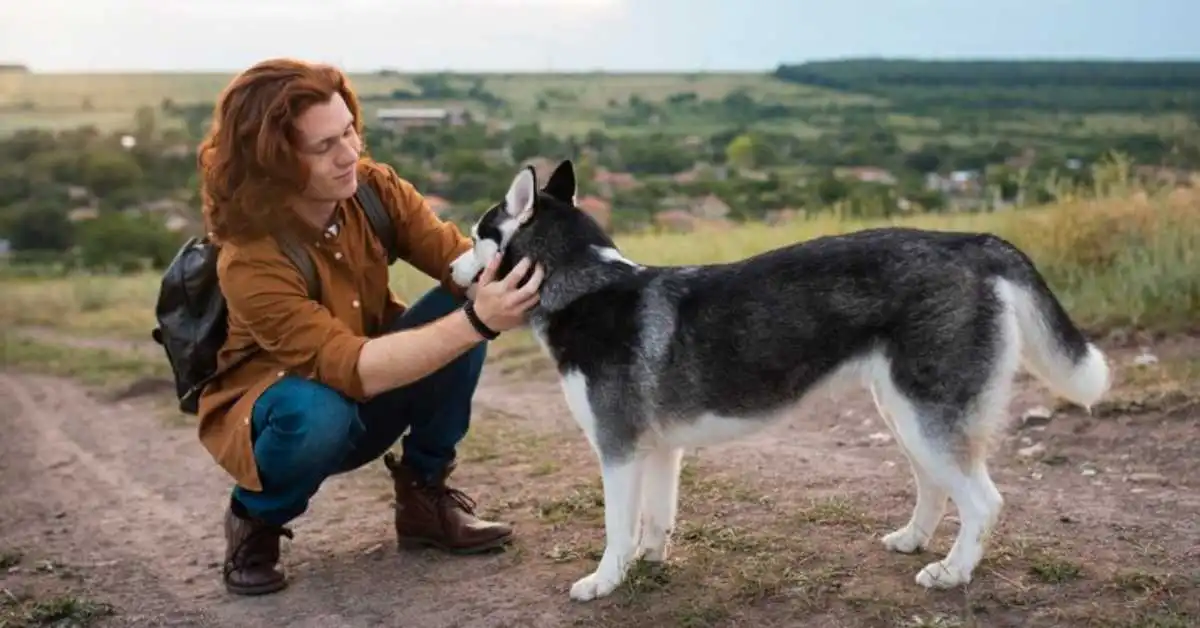I love watching my German Shepherds show affection in many special ways. One of the German Shepherd’s signs of affection is tail wagging. My dog’s tail wags enthusiastically when I come home, showing how much they miss me. They also like to lean against me, which is a sign that they trust me and want to be close for comfort and warmth.
Another German Shepherd sign of affection is following me around the house. It shows they love being near me and want to protect me. They maintain eye contact, are loyal, and always look out for me. Sometimes, they even lick me or give me playful nips to show their love.These actions help us build a strong bond full of respect and love. Understanding these German Shepherd signs of affection makes our relationship even more special.
31 Different Ways German Shepherds Show Affection

- Wagging their tail when you’re around: joy, affection, excitement, happiness, communication, emotions, excitement, happy to see you.
- Leaning against you for warmth and comfort: trust, physical contact, connection, hug, embrace, closeness, bonding, reassurance, cozy, cuddle.
- Following you from room to room: loyalty, companionship, affection, company, devotion, shadow, curiosity, protection, safety, love, and moments.
- Maintaining direct eye contact involves trust, focus, affection, comfort, the pack leader’s gaze, nonverbal conversation, and guidance.
- Licking your hands or face: affection, love, attachment, grooming, bonding, behavior, emotional comfort, pleasure, friendship.
- Playful nipping: playful, affecting, comfortable, playmate, communication, engaging, family, company, natural behavior, lighthearted.
- Bringing you their favorite toy: trust, invitation to play, fondness, engagement, gestures of cherished interaction, playmate, physical and emotional bond.
- Jumping up to greet you: excitement, happiness, closeness, joy at your return, energy, attention, enthusiastic and affectionate behavior.
- Excitement upon your arrival home: joy, affection, loyalty, bonding upon your return, presence, tail wagging, jumping, barking, playful antics.
- Protectiveness over you around strangers: affection, loyalty, safeguard, family, pack behavior, strangers, safety, instinct, guardian traits, training.
- It was relaxing with you in shared spaces: comfort, happiness, presence, mutual trust, love, security, warmth, companionship, and emotional peace.
- Barking when you leave (separation anxiety): attachment, love, separation anxiety, bonding, companionship, presence, discomfort, behavior, training.
- Sleeping in your bedroom or near your clothes: affection, scent, comfort, security, attachment, presence, familiarity, pack bonding.

14:We are pawing for your attention: interaction, affection, company, cuddling, requesting a game, signal of value, balanced and positive behavior.
15:Listening intently when you speak: respect, attention, bonding through communication, words, tone, body language, understanding, and engagement.
16:Nudging you with their nose: attention, communication, affectionate engagement, gentle cues, trust, bonding, and sweet gestures.
17:Gentle mouthing without applying pressure: playful affection, closeness, love, respecting boundaries, acceptable behavior, and communication through gentle nibbling.
18:Play bowing to invite you to a game: fun, joy, presence, trust, camaraderie, invitation to engage, pack behavior, playful affection.
19:Raising their eyebrows when they see you: excitement, joy, facial expression showing affection, connection, and emotions, subtle positive relationship signals.
20:Keeping an eye on you during walks involves protective instincts, affection, safety, loyalty, bonding, responsibility, feeling secure, and being part of the pack.
21:Patience during grooming sessions: trust, comfort, care, affection, acceptance, social bonding, emotional relationship, calm behavior.
22:Turning their backs to you shows trust: protection, care, bonded affection, vigilance, confidence, emotional symbolism, and subtle gestures.
23:Whining for attention or when you leave: attention seeking, attachment, vocal affection, connection, communication, emotional bonding, presence.
24:Rolling over for a belly rub: vulnerability, trust, affection, confidence, playful bonding, social behavior, interactive gestures.
25:Tucking their head into your lap: comfort, touch, affectionate presence, bonding, closeness, reassurance, trusting contentment.
26:Lying down with their legs spread out towards you (known as “splooging”): Comfortable trust, relaxed posture, affectionate contentment, presence, and bonding.
27:Trying to “herd” you with their nose: instinctive protective, affectionate nature, breed roots, caring, loving companions, behavioral gestures.
28:Smiling, a relaxed: open mouth, and a lolling tongue mean happiness, calm comfort, affectionate presence, joy, and contentment.
29:Sighing when they’re next to you shows contented peace, affection, comfort, presence, love, trusting bonding, emotional connection, and safety.
30:Howling with you for shared communication and bonding: communication, bonding joy, shared activity, affectionate roots, connection, cooperative interaction.
31:Healthy German Shepherd Relationship: Exercise and Play: Regular exercise, integral routine, bonding through play, fetch, running, physical activity, opportunities to strengthen bonds, love, and trust.
Enhancing German Shepherd Interaction with Fi Dog Collars
Fi Dog Collars: Tracking Your Dog’s Health and Affection
In the digital age, dog owners leverage technological advancements to enhance their relationships with their canine companions. The Fi Dog Collar is a prime example of how technology can help us better understand our dogs’ behavior and interactions.This unique collar features a comprehensive health-tracking system that allows owners to monitor their dog’s physical activity levels and exercise routines.
Understanding your German Shepherd’s love and affection becomes more feasible through the health status insights provided by Fi Dog Collars, helping you track potential health issues and allergies.
Fi Dog Collars: Building Bond through Playtime
Bonding with your German Shepherd can be significantly enhanced by engaging in playful activities. Fi Dog Collars make this easier by offering real-time tracking of your dog’s physical activity during playtime.

Activities such as fetching or using a flirt pole become more meaningful as you can monitor how much exercise your dog is getting. This boosts your bonding experience, fostering a stronger connection between you and your furry friend.
Fi Dog Collars: Ensuring Safety and Trust
Trust and safety are crucial in your relationship with your German Shepherd. Fi Dog Collars, equipped with GPS tracking capabilities, ensure you can always locate your dog and keep them safe.This not only offers peace of mind but also strengthens the bond of trust and love between you and your pet.
Understanding Your German Shepherd’s Needs with Fi
Utilizing the Fi Dog Collar provides valuable insights into your German Shepherd’s daily routine. The data collected can shed light on your pet’s active playtime, puzzle toy engagement, rest periods, and meal needs.Understanding these aspects showcases your affection and facilitates reciprocating their love in the best possible ways.
Fi Dog Collars: For the Love of German Shepherds
For the love of German Shepherds, the Fi Dog Collar serves as an intelligent tool to enhance the relationship. Offering vital insights into your pet’s behavior, health, and safety, this device helps decode their love language, allowing you to reciprocate their affection and care in every possible way. Responding to your German Shepherd’s needs based on these insights is the cornerstone of a loving bond.
Why is my German Shepherd so affectionate?
German Shepherds are renowned for their loyalty, protective instincts, and affectionate nature towards their human family members. These qualities make them exceptional companions and integral parts of the family. The strong bond and mutual trust shared between a German Shepherd and its owner stem from the breed’s affectionate disposition and history.German Shepherds’ affectionate nature is deeply embedded in their history and inherent traits. Originally bred as herding dogs, they are hardwired to protect and stay close to their pack or family.
This loyalty and protective instinct have made them not just capable working dogs but also loving family pets. Intelligent and wise, German Shepherds form profound attachments to their human companions, valuing their presence and seeking to ensure their safety. These traits, coupled with their affectionate demeanor, highlight why they remain one of the most beloved dog breeds around the world.
How do German Shepherd puppies show affection?
German Shepherd puppies exhibit their affection in many adorable ways. One of the most joyful expressions of their love is their enthusiastic tail wagging, especially when they see their favorite person. These puppies often jump excitedly or nip playfully to engage in fun interactions.They might lick your face or hands, reminiscent of how their mother would groom them, demonstrating their trust and affection. Snuggling and curling up close, especially when they fall asleep on your lap, is a sign of deep trust and
Puppies also show their attachment by following you around the house, a testament to their curious nature and desire to stay close to you.Carrying a toy to you is another endearing way they express their playful affection, seeking to bond through shared activities. When they paw at you for attention or listen intently as you speak, they’re clearly deeply engaged and connected.
Carrying a toy to you is another endearing way they express their playful affection, seeking to bond through shared activities. When they paw at you for attention or listen intently as you speak, they’re clearly deeply engaged and connected.
Whether it’s sleeping at your feet, licking your hands, or simply wagging their tails enthusiastically when they see you, these gestures form the basis of a loving and affectionate bond that only grows stronger with time.
Who is more affectionate, a male or female German Shepherd?
Determining whether male or female German Shepherds are more affectionate depends on various factors, including their unique personalities, genetics, and upbringing. Generally, both genders can exhibit high levels of affection, but they may express their love in different ways, shaped by their inherent traits and life experiences.
Male German Shepherds tend to be more protective and may develop strong bonds with their owners through their role as guardians. This protectiveness often translates to affection, as they constantly seek to ensure their owner’s safety, showing loyalty and vigilance.
On the other hand, females can often be more independent, yet they display affection through a nurturing and gentle demeanor. Their independence doesn’t detract from their ability to love deeply; rather, they might show their affection selectively, seeking out moments of quiet companionship.
Ultimately, the affection a German Shepherd shows is influenced significantly by socialization and upbringing. Dogs that receive ample socialization, positive reinforcement, and attention from a young age are more likely to develop into affectionate adults, regardless of their gender.
Understanding each dog’s unique personality and providing a loving environment that fosters trust and security can greatly impact how they express their affection.
Do German Shepherds like affection?
German Shepherds are renowned for their deep loyalty and strong bonds with their human companions. They thrive on social interactions and exhibit a remarkable emotional connection with their owners.
As a breed originally developed for working closely with humans, German Shepherds crave shared affection and rely on it to build a happy, healthy relationship. This close emotional tie helps mitigate anxiety and prevent behavioral issues by ensuring the dog feels secure and loved.
German Shepherds express and receive affection in various ways. They might demonstrate their loyalty through protective behaviors, staying close to their owners, and enjoying physical contact like cuddles and petting. Under their imposing exterior, these dogs are often gentle and patient, particularly with children.They are true softies at heart, forming strong bonds with their human family members and serving as both protective guardians and loving, loyal companions.
By reciprocating the affection they receive, owners help their German Shepherds maintain a balanced and fulfilling life. This mutual display of love fosters a robust and enduring relationship, showcasing the incredible capacity of German Shepherds to be not only vigilant protectors but also tender-hearted friends.
How can you tell if your German Shepherd loves you?
German Shepherds have distinct behaviors that clearly express their love and affection for their owners. One of the most evident signs of their love is their consistent loyalty and protective nature.
They often maintain eye contact with their owners, a gesture that signifies trust and an emotional connection. When a German Shepherd leans against you, it demonstrates their need for closeness and touch, further highlighting their affectionate bond.
Following you around the house is another strong indicator that your German Shepherd loves you. They feel safe and secure in your presence, which is why they choose to stay close. When you arrive home, their visible happiness, excited tail wagging, and sometimes even vocalizations display their joy and love.This profound bond is marked by attentiveness; a German Shepherd will often closely observe its owner’s actions and emotions, ready to respond.
Such behaviors are rooted in their pack mentality, where loyalty and protection are paramount. By leaning into you, following your movements, and maintaining vigilant protection, your German Shepherd not only shows their love but also ensures both your safety and theirs. This deep-seated affection and dedication create a lasting, cherished relationship built on mutual trust and companionship.
Final words
The affectionate nature of German Shepherds is a testament to their nurturing personalities and the strong bonds they form with their human companions. These furry friends often express their love through various actions, such as wagging their tails joyously and following their owners around the house.
Offering their favorite toy is another endearing sign of their affection, seeking to bond through shared playtime. Their unwavering loyalty is evidenced by their expressive actions, from cuddling and licking to play-bowing, showing their genuine love.
Each German Shepherd’s unique personality lays the foundation for a strong bond built on mutual respect and affection. These canines cherish the precious moments they share with their families, deepening their connection with each loving gesture they both give and receive.Through these reciprocal acts of love, a beautiful relationship blossoms, filling the hearts and lives of both the German Shepherd and their human family with joy and contentment.
FAQs
How do you show your German Shepherd that you love them?
Spend quality time with your German Shepherd through play and training sessions. Provide them with a balanced diet and regular veterinary care. Show affection through petting, praise, and positive reinforcement.
How do you know when a German Shepherd is happy?
A happy German Shepherd typically exhibits a relaxed posture with a wagging tail. They may also show excitement through playful behaviors and a bright, alert expression. Additionally, they might seek attention and physical affection from their owner.
What do German Shepherds love the most?
German Shepherds love physical exercise and mental stimulation. They enjoy activities like fetch, agility training, and long walks. Additionally, they thrive on companionship and spending quality time with their owners.
